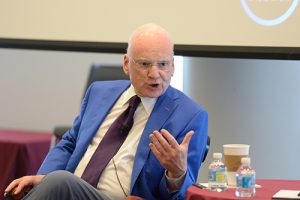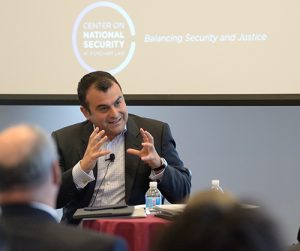National security, military, and government officials, civil liberties advocates, experts and legal scholars evaluated the meaning of America’s post-9/11 actions, the nation’s subsequent gains and losses, and its current safety level during the Center on National Security’s daylong conference titled “Hindsight: Reflections on 15 Years of the War on Terror” held on April 26.
The conference featured an opening conversation between former U.S. counterterrorism czar Richard Clarke and Center on National Security Director Karen Greenberg that addressed
the contents of a classified 28-page portion of a joint congressional report on 9/11, the fallout from what Clarke described as President Obama’s “overcautious” approach to Syria, and America’s struggles to combat cybersecurity threats.
The panels that followed—“Reconciling Liberty and Security in 2016,” “Today’s Foreign Policy Matrix,” and “The Evolution of Terrorism from al Qaeda to ISIS”—addressed the difficult choices necessary in combating ever-present and ever-changing threats. The free-flowing conversation between John Miller, the NYPD’s deputy commissioner of intelligence and counterterrorism, and Ali Soufan, a former FBI agent and chairman/CEO of The Soufan Group, provided the audience with firsthand accounts of how terrorism spread from the mountains of Afghanistan and is combated today in New York.
“This center has hosted hundreds of events. This is the culmination,” Greenberg told the audience prior to her conversation with Clarke. Greenberg selected the panelists for their blend of creativity and conscience in considering national security matters since 9/11.
Even among the impressive group assembled Clarke stood out, Greenberg said.
Clarke served as national coordinator for security, infrastructure protection, and counterterrorism for Bill Clinton and George W. Bush. He now serves as the chairman of Good Harbor Consulting, a strategic planning and corporate risk management company, and is the author of nonfiction books and novels about national security and cybersecurity.
Clarke’s conversation with Greenberg came at a time when Congress continues to weigh a bipartisan 9/11 bill that would allow U.S. citizens to file lawsuits against countries who sponsor terrorists. The bill has sparked increased interest in 28 classified pages in the Joint Inquiry Into Intelligence Community Activities Before and After the Terrorist Attacks of Sept. 11, 2001, rumored to link Saudi Arabian royals and plane hijackers. The secret information will become public in five or six weeks accompanied by explanatory commentary about its contents, Clarke said.
The classified portion of the 900-plus page report includes information about the relationship between two Saudi hijackers and a Saudi intelligence official the hijackers met soon after arriving in San Diego in 2000, Clarke revealed, noting he testified to the joint congressional committee for seven hours. Clarke believes the CIA tried to turn the two would-be terrorists into informants while withholding information about the threat they posed from other agencies.
“If I had known those two guys were in the United States, they’d have been arrested,” Clarke said. “Would that have stopped 9/11? We’ll never know.”
The report’s classified section also includes information about the Ministry of Islamic Affairs, a cabinet office in Saudi Arabia, which supported the building of fundamentalist Sunni mosques often frequented by al Qaeda members.
“It was not a knowing policy for Saudi Arabia to support al Qaeda,” Clarke said. Supporting al Qaeda, an organization that publicly promised death for Saudi officials, would have amounted to a suicide mission for the Saudis, he added.
At present, the United States understands and handles the cyberthreats it faces better than any other nation in the world, save Israel, Clarke said. He expressed hope President Obama would scale down the growing counterterrorism industrial complex before leaving office in January 2017 and cautioned against future leaders creating a surveillance state that eschews rigorous transparent supervision and oversight in order to combat terror threats.
Obama made a mistake when he chose not to aid Syrian rebels before Daesh, also known as ISIS, grew larger and deadlier, Clarke said. Clarke understood Obama’s “overcautious” Middle East policy as an overreaction to his predecessor George W. Bush’s “crazy adventurism” and “war crimes on steroids” approach to the region.
The death of al Qaeda mastermind Osama bin Laden coincidentally produced “much more independent and powerful” terror franchises across the region, Clarke said, a development that Miller and Soufan later discussed while weighing the different approaches al Qaeda and ISIS took in the past 15 years.
“The ideas of Osama bin Laden are stronger than ever today,” Soufan said, describing ISIS as “an accident of history caused by political, economic, and social factors in the region.” He also described ISIS as a “smokescreen” for al Qaeda, which controls more land.
Both Miller and Soufan remarked on the significant growth of radical Islamic militants fighting in the Middle East. In the past three to four years, the number has grown from 12,000 to 38,000, due to successful uses of propaganda that the United States has yet to successfully counteract.
More than 5,000 residents of Western Europe have gone to fight in Iraq and Syria. By comparison, only 150 Americans out of 250 who have tried have made it to these countries to fight for ISIS.
What America gained in the wake of 9/11 was what it didn’t lose, Miller said, namely that it did not find itself in Europe’s predicament. The European nations deal with the same threats but do not share information across borders effectively enough, Miller said.
Yet, the years after 9/11 have resulted in significant losses for democracy, human rights, and individual privacy, Miller said, pointing to indefinite detention, torture, and NSA mass spying. They regrettably did not include effective conversations with Muslim communities about how to confront Islamic extremists, he continued. Both men advocated for building better relationships with Muslim communities in America.





